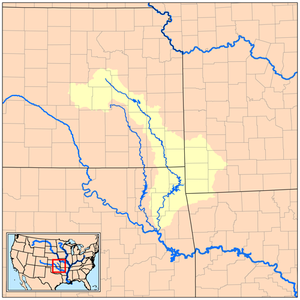Neosho River
| Neosho River | |
|
Neosho River near Neosho Rapids, Kansas
|
|
| Country | United States |
|---|---|
| States | Oklahoma, Kansas |
| Source | Near White City, Kansas |
| - elevation | 1,450 ft (442 m) |
| - coordinates | 38°47′22″N 96°44′39″W / 38.78944°N 96.74417°W |
| Mouth | Arkansas River |
| - elevation | 489 ft (149 m) |
| - coordinates | 35°47′32″N 95°17′40″W / 35.79222°N 95.29444°WCoordinates: 35°47′32″N 95°17′40″W / 35.79222°N 95.29444°W |
| Length | 463 mi (745 km) |
| Basin | 11,534 sq mi (29,873 km2) |
| Discharge | for USGS gage 07191500 near Chouteau, OK |
| - average | 8,954 cu ft/s (253.5 m3/s) |
| - max | 154,000 cu ft/s (4,360.8 m3/s) |
| - min | 12 cu ft/s (0.3 m3/s) |
|
Map of the Neosho River and its watershed
|
|
The Neosho River is a tributary of the Arkansas River in eastern Kansas and northeastern Oklahoma in the United States. Its tributaries also drain portions of Missouri and Arkansas. The river is about 463 miles (745 km) long. Via the Arkansas, it is part of the Mississippi River watershed. Its name is an Osage word meaning "clear water."
The Neosho's headwaters are in Morris County, Kansas, and it flows southeast through Kansas. In Ottawa County, Oklahoma, the river turns south-southwest for the remainder of its course through Oklahoma. It meets the Arkansas River near the city of Muskogee, about a mile downstream of the confluence of the Arkansas River and the Verdigris River. The area of convergence of the three rivers Arkansas, Verdigris and Neosho is called "Three Forks."
In Oklahoma the Neosho ends at its confluence with Spring River at Twin Bridges State Park. From that point on it is called the Grand River. The Grand River flows south to the Grand Lake.
The Neosho has been dammed at several points along its course, in most cases by the U.S. Army Corps of Engineers. In Kansas, a dam upstream of Council Grove forms Council Grove Lake, and a dam near New Strawn forms John Redmond Reservoir. There are also 12 dams in between John Redmond and the Kansas border. In Oklahoma, a dam at Langley forms the Neosho's largest reservoir, the Grand Lake o' the Cherokees. A dam near Locust Grove forms Lake Hudson, (also known as Markham Ferry Reservoir), and a dam upstream of Fort Gibson forms Fort Gibson Lake.
...
Wikipedia


